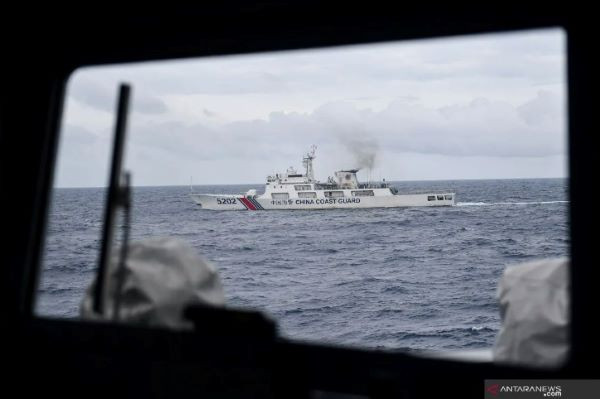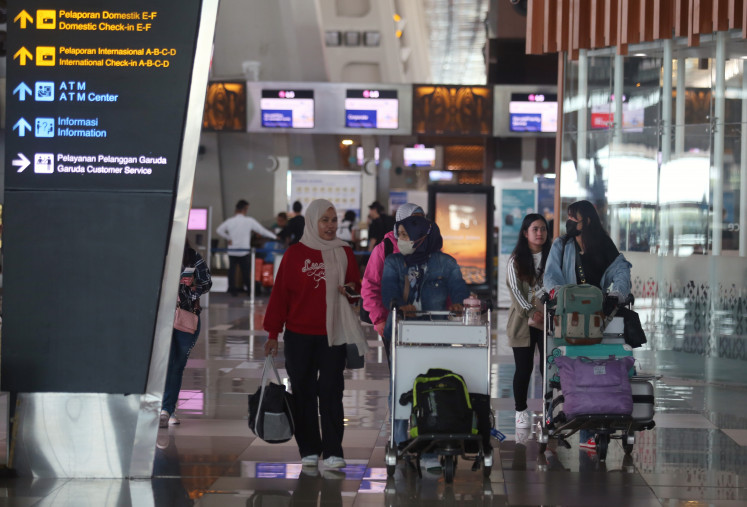Ending poverty requires ending tax evasion
However, is a single-digit poverty rate a cause for celebration?
Change Size
 A man standing in front of his house in a slum under a highway in Teluk Gong, North Jakarta. The neighborhood is filled with settlements made of thin wood boards as their walls and shared the bottom of the bridge as their roofs. (JP/Nea Maryami Ningtyas)
A man standing in front of his house in a slum under a highway in Teluk Gong, North Jakarta. The neighborhood is filled with settlements made of thin wood boards as their walls and shared the bottom of the bridge as their roofs. (JP/Nea Maryami Ningtyas)
N
ew data from the Central Statistics Agency (BPS) shows that as of March, the number of Indonesians living below the poverty line is 9.82 percent. The fact that this is the lowest level ever recorded is viewed by many as a special achievement.
However, is a single-digit poverty rate a cause for celebration?
First of all, let us be clear about what this statistic means. Data shows 25.95 million people live below the poverty line, which is itself arguably too low. The poverty line in Indonesia is defined as monthly expenditure not exceeding Rp 401,220 or 90 US cents a day. This standard is roughly half the World Bank’s limit, which is set at $1.90.
The issue of threshold aside, let us put the new data into perspective. The number of people living on less than $1 a day in Indonesia is roughly equal to the total population of the 10 eastern provinces, from Papua to North Sulawesi. What if the headline had instead read “All residents of Sulawesi, Maluku and Papua Islands live below poverty line”? Would this still be a special achievement?
The point is, 26 million people living on less than $1 a day is simply unacceptable. This is not to disparage the government’s war on poverty. Indeed, the BPS identified a number of government programs as the main drivers in lowering poverty. More importantly, the concerted effort to eradicate poverty has made the reduction of poverty a consistent trend in the Reform Era.
Over the last 18 years, the number of poor people in Indonesia declined by 12.79 million, a reduction of 33 percent. But then again, we are talking about abject poverty and therefore this pace of poverty reduction is just too slow. And it is unnecessarily so.
A more aggressive approach to combating poverty would be possible if the government had strong fiscal capacity. The problem is that our fiscal capacity is weak and there are troubling signs that it is becoming weaker.
One of the most crucial, yet at times overlooked, elements in the effort to boost the ability of the government to generate revenue is its success in detecting and prosecuting tax evasion.
Evasion and noncompliance in general is widespread and has robbed the government of its ability to successfully wage its war against poverty. In other words, to eliminate poverty without relying too much on external financing or sacrificing other important priorities, the government must first win the war on tax evasion.
Thanks to recent developments in the global arena, including the BEPS Project and exchange of information initiatives championed by the G20 and the Organization for Economic Cooperation and Development (OECD), Indonesia now has a set of regulations in place, the most important of which is Law No. 9/2017 on access to financial information for tax purposes, which gives the government a much better chance to discover and deter tax evasion.
An equally potent, though perhaps underutilized weapon, is Government Regulation No. 36/2017, which allows the government to recover the revenue lost to tax evasion. The regulation, which is a follow up to the tax amnesty, provides that assets discovered by the Taxation Directorate General and deemed to have not been properly disclosed by taxpayers are to be treated as income and subject to a final tax of up to 30 percent and a penalty of 200 percent for a total of 90 percent.
So $1 of undisclosed assets could potentially yield the government 90 cents in additional revenue.
Although roughly $74 billion in offshore assets were disclosed and a further $11 billion repatriated in the tax amnesty, there are indications that the wealthiest Indonesians have not come clean entirely. But how much assets do Indonesians keep abroad? The Finance Ministry estimates the overall figure is around $785 billion. Consulting firm McKinsey’s was reported to put the figure at around $250 billion.
However, perhaps the best source to derive a more precise figure are self-estimates made by the wealthy themselves. According to a report by Capgemini, another global consulting firm, on average, high-net wealth Indonesian individuals put 37 percent of their assets abroad. The same individuals held 25 percent of their total assets in cash and equivalent.
The latest data from the Deposit Insurance Agency (LPS) shows that the aggregate amount of bank accounts with a minimum value of $357,000 (Rp 5 billion) is $183 billion. Combining this information with the Capgemini report, we find that the total assets held by the wealthy (i.e. the holders of at least Rp 5 billion in bank accounts) is around $731 billion of which $270 billion is held offshore. Note that this figure is much closer to McKinsey’s estimate than to the official government estimate.
Deducting $85 billion already declared and repatriated through the tax amnesty, that leaves roughly $185 billion in undisclosed assets, which if discovered could generate up to $167 billion in revenue for the government. This is not including potential revenue from undisclosed assets right here at home.
Just imagine what the government could do for poverty elimination with that amount of windfall revenue. As a comparison, the government’s revenue target this year is only $136 billion, with around $60 billion allocated for education, health and social protection.
The rich and wealthy who evade their fair share of tax, hide their ill-gotten wealth overseas and refuse to come clean through the tax amnesty must know that the government knows this, and is able and willing to go to the trouble to recover its rightful revenue.
Successful actions against tax evaders and recovery of lost tax revenue will not only deter potential future evaders but also restore justice to the millions of compliant taxpayers and, more importantly, enable the government to have the resources it needs to reach out to the millions of unfortunate Indonesians and lift everyone to the last person out of the miserable condition we call poverty.
Law 9/2017 and Government Regulation 36/2017 are both important, but here’s the catch: the latter applies to non-amnesty participants only until June 30, 2019. Political year or not, the time to act is now.
***
The writer is a staff member at the Taxation Directorate General. The views expressed are his own.









